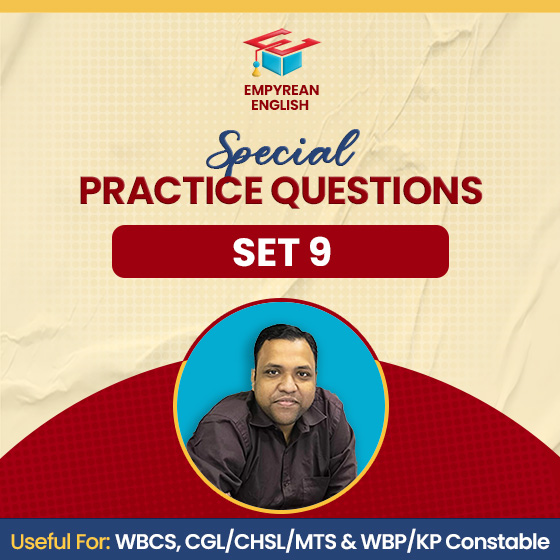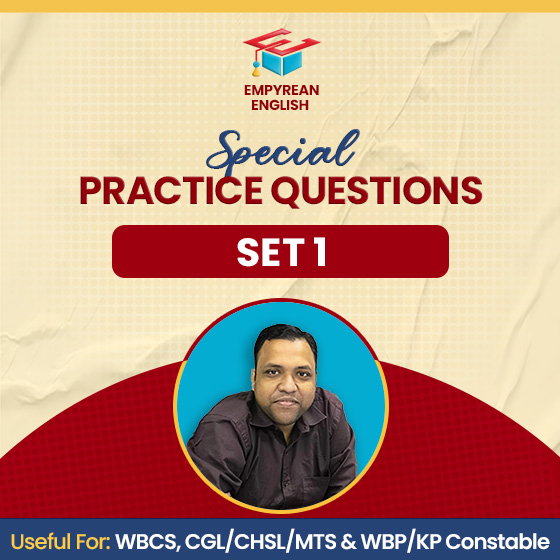Enhance your English skills with these carefully curated practice questions. This set focuses on improving grammar, vocabulary, and comprehension. Designed to help you succeed in exams like WBCS, CGL/CHSL/MTS & WBP/KP Constable, and more!
1. In the following question, a sentence has been given in Direct/ Indirect speech. Out of the four alternatives suggested, select the one which best expresses the same sentence in Direct/ Indirect speech.
“I expect them here by Tuesday,” said the duke.
(A) The duke said that I expected them here by Tuesday.
(B) The duke said that he expected them there by Tuesday.
(C) The duke said that he expected them here by Tuesday.
(D) The duke said that he expects them there by Tuesday.
2. In the following question, a sentence has been given in Direct/ Indirect speech. Out of the four alternatives suggested, select the one which best expresses the same sentence in Direct/ Indirect speech.
She said excitedly, “I can’t wait to see the new movie!”
(A) She exclaimed that she couldn’t wait to see the new movie.
(B) She said excitedly that she can’t wait to see the new movie.
(C) She said excitedly that she couldn’t wait to see the new movie.
(D) She excitedly said that she couldn’t wait to see the new movie.
3. In the following question, a sentence has been given in Active/ Passive Voice. Out of the four alternatives suggested, select the one which best expresses the same sentence in Passive/ Active Voice.
The old building was demolished by the construction crew last week.
(A) The construction crew demolished the old building last week.
(B) The construction crew will demolish the old building next week.
(C) The construction crew is demolishing the old building this week.
(D) The construction crew demolishes the old building every week.
4. In the following question, choose the word opposite in meaning to the given word.
RIGID
(A) inevitable (B) precise
(C) complacent (D) flexible
5. Select the most appropriate synonym for the highlighted word.
The company’s cutting-edge products set new industry standards.
(A) obsolete (B) ancient
(C) advanced (D) humble
6. Select the most appropriate meaning of the given idiom.
Hit the nail on the head
(A) Miss the target
(B) Strike someone with a hammer
(C) Make a correct assessment or guess
(D) Make a loud noise
7. In the question below, an idiom is given, followed by four options. Select the option that gives the correct meaning of the idiom.
An ankle biter
(A) a small child
(B) an annoying person
(C) a foolish person
(D) a person who easily gets angry
8. Select the most appropriate synonym of the given word.
PROFICIENT
(A) frigid (B) upset
(C) adept (D) dense
9. Select the most appropriate ANTONYM of the underlined word.
The tumultuous storm wreaked havoc on the coastal town, causing widespread destruction and chaos.
(A) Tranquil (B) Futile
(C) Disorderly (D) Fragile
10. Select the option that expresses the given sentence in passive voice.
She paints the walls every year.
(A) The walls are painted by her every year.
(B) The walls were paint by her every year.
(C) The walls were painting by her every year.
(D) The walls were painted by she every year.
- Answer: (B)
Option B is the right answer.
The sentence is in direct speech and in simple future tense. To convert this sentence to the
indirect speech, follow these rules:
i) Remove the comma and the inverted commas.
ii) The subject (THE DUKE) will begin the sentence followed by SAID.
iii) Put THAT between the reporting and reported speeches.
iv) The simple present tense verb EXPECT will change to the past tense EXPECTED.
v) HERE changes to THERE.
vi) The first person pronoun I will change to the third person pronoun HE.
- Answer: (C)
The sentence is in direct speech and in the indicative mood. To convert this sentence to indirect speech, follow these rules:
i) Remove the comma and the inverted commas.
ii) Begin the indirect speech sentence with the reporting speech clause SHE SAID EXCITEDLY.
iii) Put THAT between the reporting and reported speeches.
iv) Change the modal verb CAN’T to COULDN’T to reflect past tense.
v) The first person pronoun I will change to the third person SHE.
Thus, C is the right answer.
- Answer: (A)
(a) is the correct answer. The sentence is in the passive voice. The rules to change the passive voice to active voice are as follows:
i) The subject clause will become the object clause. Here, the subject THE OLD BUILDING will become the object, and the object THE CONSTRUCTION CREW will become the subject and begin the sentence.
ii) Replace WAS DEMOLISHED with DEMOLISHED to agree with the past tense of the original sentence.
iii) Remove the conjunction BY before THE CONSTRUCTION CREW.
- Answer: (D)
RIGID means unable to be changed or adapted. FLEXIBLE (able to be changed according to the situation) has the opposite meaning of the given word. Thus, D is the right answer.
Inevitable – unavoidable.
Precise – accurate.
Complacent – self-satisfied.
- Answer: (C)
CUTTING-EDGE means at the forefront of technological development; innovative or pioneering.
ADVANCED is a synonym, and it means far on or ahead in development or progress. Hence, C is the correct answer.
Obsolete – no longer produced or used; out of date.
Ancient – belonging to the very distant past.
Humble – having or showing a modest or low estimate of one’s own importance.
- Answer: (C)
The phrase “Hit the nail on the head” means to make a correct assessment or guess.
Example: When John said the problem was due to faulty wiring, he really hit the nail on the head.
Thus, C is the correct answer.
- Answer: (A)
The idiom ANKLE BITER means a small child. Thus, A is the right answer.
None of the other options correctly conveys the meaning of the idiom.
- Answer: (C)
The word PROFICIENT means skilled or good at something. The word ADEPT means skilled or expert and is the most appropriate synonym of the given word. Thus, C is the right answer.
Frigid – freezing cold. Upset – unhappy; sad. Dense – thick.
- Answer: (A)
TUMULTUOUS (adjective) means making a loud, confused noise; uproarious. Example: The tumultuous crowd surged forward, shouting and pushing. TRANQUIL (calm) is its antonym. Thus, A is the right answer.
Futile – pointless. Disorderly – untidy. Fragile – weak.
- Answer: (A)
To convert the sentence from active to passive voice:
i) The subject clause SHE becomes the object clause HER, and the object clause THE WALLS becomes the subject clause.
ii) The verb “paints” changes to “are painted” to maintain the present tense.
iii) The subject “her” is moved after “by” to indicate the doer of the action in passive voice.
Thus, A is correct.
আমাদের Objective এবং Descriptive English-এর পেইড ব্যাচে ভর্তি হতে নিচের ফর্মটি পূরণ করুন:


